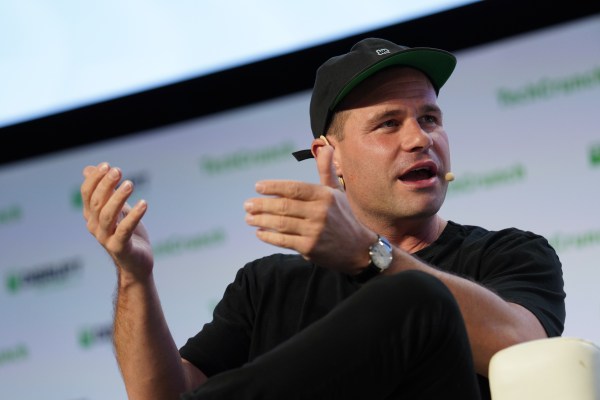Cannabis and gaming payments startup Aeropay is now offering an alternative to Mastercard and Visa | TechCrunch
The key to taking on legacy players in the financial technology industry may be to go where they have not gone before.
That’s what Chicago-based Aeropay is doing. The provider of pay-by-bank solutions for businesses started out helping cannabis retailers and gaming companies with their payments and is now entering into Visa and Mastercard’s territory by innovating the payment networks.
Co-founder and CEO Dan Muller has a background as head of product for a company that built digital solutions for brands and retailers. At the time, mobile was coming online, so he ended up building native mobile apps for brands like Best Buy, Adidas and Express, which gave Muller firsthand experience in payments.
“When you peel back the layers of the legacy way to solve digital payments, it was either make it easier to accept the card online, like Stripe or Square, or you could attempt something really grand, which was to go around the system,” Muller told TechCrunch.
With Aeropay, businesses can offer regulatory compliant, cashless and contactless digital payments to their customers, both in-store and online. To do this the company created its own bank aggregator, called Aerosync, that connects bank accounts and enables customizable integrations using open APIs.
It can connect over 12,000 banks, and once the merchant connects to a bank account, they can enable customers to pay just like they would in any e-commerce environment. Merchants can also utilize a QR code for payments and not pay fees on the transaction, or bother with cash. This would allow, for example, the merchant’s customer to choose the amounts to pay and confirming in checkout. If customers are using a digital wallet, merchants choose the amount and confirm a submission to a digital wallet, Muller said.
One of the differentiators to other companies creating digital payment solutions is that Aeropay started with regulatory and compliance as a focus, unlike other companies that started with a product and the compliance “was an afterthought,” Muller said. As a result, he believes merchants are able to minimize return and fraud risk. Aeropay uses Automated Clearing House to facilitate direct bank-to-bank transfers, which means there are no card networks involved. That’s why it’s good for the cannabis industry, which is not able to utilize payment card networks.
Becoming the ‘next great payment network’

The concept has caught on. Over the past year, Aeropay says it recorded 10x revenue growth (but wouldn’t comment on what that revenue was) and is processing over $1 billion in volume annually, Muller said. He did say it reached cash-flow profitability in the fourth quarter of 2023.
Now it has a $20 million Series B round led by Group 11 that also included participation from Chicago Ventures and Continental Investors. The new investment gives Aeropay $35 million in total funding to date.
Aeropay doesn’t compete with Visa and Mastercard today, but does want to be “the next great payment network,” Muller said. The card swipe is what costs merchants the most, and Aeroplay not only removes that, but doesn’t require apps or new hardware, it can integrate with a merchant’s existing systems. To have that requires an affordable rail, a great user experience and something with low fraud and risk. Muller said the company has those three characteristics, however, it is missing one thing if it is to become a Visa or Mastercard: more merchants to use it.
“We need distribution to reach the same type of level,” Muller said. “The name of the game for us now with this capital is to reach a level distribution to get the benefits that we’ve created — the seamless bank connection, the really low fraud and risk issues that we see and mainly the affordability at the merchant. A bank transfer account is going to be much more affordable than a card swipe, and then they can bring those savings to their consumers.”
Muller will use the new funding to develop and build out the team in the areas of go-to-market, technical, compliance and risk. Over the past year, the company went from standard support to 27/4 support, so Aeropay invested in customer care teams, and Muller expects that to grow this year.
Playing to strengths
Card networks is something Group 11’s founding partner Dovi Frances told TechCrunch is something virtually “no one has touched because it is so complicated.” He sees Aeroplay moving in where other players can’t from a regulatory perspective and then grow.
Group 11 is a three-year-old venture firm which predominantly invests in Israeli financial technology companies that move to the Americas. It has about $1 billion in assets under management and is one of the first backers of expense management company Navan, accounts payable company Tipalti and real estate technology company Homelight.
Frances met Muller about three years ago, but didn’t initially invest in Aeropay. That was back when Aeropay was working on cannabis and “nobody wanted to touch the cannabis industry,” Frances said.
Instead, Frances stayed in touch with Muller and the Aeropay team during that time.
“Then I saw that they were now at a point where the solution seems robust enough from a technological perspective, it has attracted significant clients and the C-suite is starting to look like the C-suite that I would like to see at a company where I make significant investment,” Frances said. “I’m not talking about the seed investment, I’m talking about seriously.”
Frances typically puts financial technology into three buckets: architecture, coordination and application. He sees companies like Swift, Visa and Mastercard in the architecture space, being the infrastructure leaders. The coordination layer would be companies like Square that sits in between the application and architecture layers. An example of the application layer would be neobanks.
He sees Aeropay in the coordination layer — being able to present a challenge to the traditional card networks of Visa and Mastercard.
“Without a doubt it is played on steroids,” Frances said. “In Aeropay, we managed to find the last stronghold of one of the last areas of financial technology to get disrupted. It’s a massive market that is for the taking, and it has an incredibly talented team that’s been executing on this vision for quite a few years now.”




